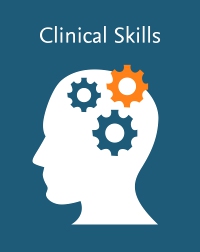
Clinical Skills: Oncology Collection (Access Card), 1st Edition
Clinical Skills Online - Access Card

$119.00
Learn to master the most important nursing skills before you ever step foot in the clinical environment. Clinical Skills: Oncology Collection is an engaging, web-based learning tool that guides users through more than 70 of the most important oncology nursing skills. Each skill in the collection uses the same seven-part framework to walk you through every aspect of the skill. From special patient and safety considerations to the equipment and techniques used in the skill, this assembly of animations, interactive learning tools, and in-depth explanations will leave you with a 360-degree understanding of how to safely and effectively perform each skill.
-
- Convenient web-based program utilizes the same professional format that practicing nurses use to train.
- Consistent, competency-based format for learning skills offers a standardized way for you to learn and perform skills. Most skills feature the same types of skill learning tools to help you obtain a more holistic understanding of the skill and standard QSEN nursing competencies.
- Quick sheet provides a concise, step-by-step summary of the skill.
- Extended text offers an in-depth look at all aspects of the skill. Subjects addressed in the extended text section include:
- Safety alerts
- Supplies
- Patient and family education
- Procedures
- Delegation opportunities
- Monitoring and care
- Expected and unexpected outcomes
- Documentation guidelines
- Special gerontologic, pediatric, and home care considerations
- Evidence-based references
- Additional reading suggestions
- Equipment list helps familiarize you with each piece of equipment needed to perform the skill.
- Demonstration videos and animations visually guide you through every necessary step involved in the skill.
- Images and illustrations highlight crucial procedures, equipment, and documents involved in the skill.
- Competency tests with rationales help you review and evaluate your understanding of the skill.
- Printable evaluation checklists help you measure and track various skill competencies.
- Continually updated, evidence-based content is reviewed and revised annually by clinical skills experts to reflect changes in practice as they arise.
-
Examples of skills in this collection include:
• Acute Graft-Versus-Host Disease: Management (Oncology)
• Advance Directive Discussion (Oncology)
• Alopecia Management (Oncology)
• Anemia Management (Oncology)
• Anorexia and Cachexia Management (Oncology)
• Antineoplastic Drug Administration: Intraoperative (Oncology)
• Antineoplastic Drug Administration: Intraperitoneal (Oncology)
• Antineoplastic Drug Administration: Intrathecal (Oncology)
• Antineoplastic Drug Administration: Intravenous (Oncology)
• Antineoplastic Drug Administration: Oral (Oncology)
• Antineoplastic Drug Administration: Pretreatment Assessment, Initial and Subsequent Cycles (Oncology)
• Antineoplastic Drug Administration: Pretreatment Verification (Oncology)
• Antineoplastic Drug Administration: Subcutaneous (Oncology)
• Antineoplastic Drug Administration: Vesicant and Irritant Agents (Oncology)
• Antineoplastic Therapy: Dermatologic Adverse Event Management (Oncology)
• Antineoplastic Therapy: Sexual Adverse Effects Management (Oncology)
• Bowel Obstruction Management (Oncology)
• Cardiac Tamponade Management (Oncology)
• Cardiac Toxicity Management (Oncology)
• Chemotherapy-Induced Peripheral Neuropathy Management (Oncology)
• Complementary, Alternative, and Integrative Therapies (Oncology)
• Constipation Management (Oncology)
• Containment of Hazardous Drug Spills (Oncology)
• Depression Management (Oncology)
• Diarrhea Management (Oncology)
• Disseminated Intravascular Coagulation (DIC) Management (Oncology)
• Distress Management for Patients with Cancer and Their Caregivers (Oncology)
• Dysphagia Management (Oncology)
• Dyspnea Management (Oncology)
• End-of-Life Discussions (Oncology)
• Esophagitis Management (Oncology)
• Fatigue Management (Oncology)
• Febrile Neutropenia Management (Oncology)
• Hiccups Management (Oncology)
• Hot Flashes Management (Oncology)
• Hypercalcemia of Malignancy Management (Oncology)
• Hypersensitivity Reactions Management (Oncology)
• Infection Management (Oncology)
• Infection Prevention Management for Patients with Neutropenia (Oncology)
• Lymphedema Management (Oncology)
• Malignant Pleural Effusion Management (Oncology)
• Mucositis Management (Oncology)
• Nausea and Vomiting Management (Oncology)
• Neurocognitive Dysfunction Management (Oncology)
• Noisy Respirations at End of Life: Management (Oncology)
• Ocular Toxicity Management (Oncology)
• Osteoporosis Management (Oncology)
• Pain Management (Oncology)
• Pulmonary Toxicity Management (Oncology)
• Radiation Pneumonitis Management (Oncology)
• Radiation Therapy Assessment (Oncology)
• Safe Handling of Hazardous Drugs (Oncology)
• Sexual Alterations Management (Oncology)
• Spinal Cord Compression Management (Oncology)
• Superior Vena Cava Syndrome Management (Oncology)
• Survivorship Management (Oncology)
• Syndrome of Inappropriate Antidiuretic Hormone (SIADH) Management (Oncology)
• Teaching About Taking Oral Agents for Cancer at Home (Oncology)
• Teaching How to Be Safe at Home During Chemotherapy (Oncology)
• Teaching About Cancer Prevention Measures (Oncology)
• Teaching About Cancer Risk and Cancer Screening Guidelines (Oncology)
• Thrombocytopenia Management (Oncology)
• Thrombotic Thrombocytopenic Purpura Management (Oncology)
• Tumor Lysis Syndrome Management (Oncology)
• Venous Catheter: Flushing and Locking Infection Prevention (Oncology)
• Venous Thromboembolism Management (Oncology)
• Xerostomia Management (Oncology)
For a list of all current skills in this collection, please contact your Elsevier Representative.

 as described in our
as described in our 